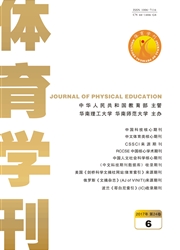

 中文摘要:
中文摘要:
运动员内稳态的品质表征了健康水平和运动水平。运动训练的平台期对应于运动员的内稳态。运动训练的过程是打破低水平内稳态重建高水平内稳态的过程。竞技训练对运动水平的提高也是对健康水平的提高。内稳态品质的提高至少包括体力和智力两个密切联系的部分,智力提高的空间远远大于体力提高的空间,加强智力开发有助于运动水平的提高和运动寿命的延长。对运动的兴趣和喜好是运动训练的内在奖赏机制。对运动的兴趣越浓,对运动疲劳的忍受能力越强,运动水平的提高和运动寿命的延长就越显著。因此,科学训练的信息应该通过健康传播普及到大众健身活动中,奥运健儿应该在全民健身的基础上选拔。
 英文摘要:
英文摘要:
The quality of homeostasis of an athlete embodies the levels of his/her health and sports performance. The steady period in sports training corresponds to the homeostasis of the athletes. The process of sports training is a process in which the homeostasis at a lower level is destroyed while the homeostasis at a higher level is established. Training for competition enhances both the level of health and the level of sports performance. The enhancement of the quality of homeostasis at least includes such two closely related parts as physical strength and intelligence. There is much more room for intelligence enhancement than for physical strength enhancement. Strengthening the development of intelligence is conducive to the uplift of the level of sports performance and the prolongation of sports life. The interest in and love for sport are the intrinsic rewarding mechanism in sports training. The more interested in sport, the stronger the capability for resisting sports fatigue, and the more significant the uplift of the level of sports performance and the prolongation of sports life. Therefore, the authors proposed that scientific training should be popularized in mass physical exercise via health communication, and that Chinese athletes for the Olympic Games should be selected based on nationwide physical exercise.
 同期刊论文项目
同期刊论文项目
 同项目期刊论文
同项目期刊论文
 期刊信息
期刊信息
